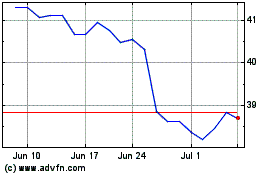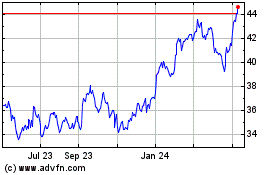GlaxoSmithKline Names Emma Walmsley as Next Chief Executive -- 2nd Update
September 20 2016 - 9:49AM
Dow Jones News
By Denise Roland
LONDON-- GlaxoSmithKline PLC said its head of consumer health
care, Emma Walmsley, will succeed Andrew Witty as chief executive,
in a move that cements the company's shift away from its dominant
prescription-medicine business.
Ms. Walmsley, 47 years old, will take up the post when Mr. Witty
steps down on March 31, making Glaxo the only top-tier
pharmaceutical company to be led by a woman. The consumer
health-care division, which she has run since 2010, sells drugstore
staples such as toothpaste and painkillers.
Her appointment is likely to draw a mixed response from
investors given her lack of direct pharmaceutical experience. Ms.
Walmsley spent most of her career at cosmetics giant L'Oréal SA
before joining Glaxo six years ago.
Some investors were eager to see an executive with experience in
managing the development of innovative drugs take up the role, to
breathe new life into the company's drug pipeline, which has
suffered some setbacks in recent years.
Still, it won't have come as a big surprise: Ms. Walmsley was
widely touted as a strong internal contender for the job.
The decision was uncontroversial within Glaxo's management: The
board voted unanimously that she should succeed Mr. Witty,
according to a person familiar with the situation. Ms. Walmsley is
well respected within the company, having presided over a period of
rapid expansion of Glaxo's consumer-health-care unit following the
formation of a joint venture with Novartis AG.
"She has been very clear with the board that an absolute
priority will be fostering and boosting innovative drugs," the
person said. "She recognizes the potential that has for the
company's performance in the near and medium term."
The person added that Ms. Walmsley regularly weighs in on other
parts of the business during executive board meetings. "Just
because they're not talking about consumer" doesn't mean she lacks
a point of view, the person said.
Andrew Baum, an analyst at Citi, said Ms. Walmsley could improve
Glaxo's research productivity despite her lack of experience in
that area as long as she undertook a critical assessment of the
company's research outcomes and made some senior hires in the
pharmaceuticals business.
Ms. Walmsley won't have the luxury of focusing squarely on the
pharmaceuticals business. She will take the reins in the middle of
a strategic shift engineered by her predecessor. While other major
drug companies increasingly focus on expensive new therapies for
cancer and other diseases, Mr. Witty, 52, has put increasing
emphasis on low-margin, high-volume consumer-health-care products
and vaccines.
He achieved that largely through a three-part, $20 billion deal
with Novartis that involved swapping Glaxo's cancer-drug portfolio
for the Swiss company's vaccines business and pooling their
consumer-health-care businesses into a joint venture controlled by
the U.K. company.
Mr. Witty engineered the transaction to reduce Glaxo's
dependence on the risk-laden drug-discovery part of the business,
which succeeds or fails on the outcomes of lengthy and expensive
clinical trials, patent life cycles and the willingness of
governments and health insurers to spend ever-tighter budgets on
medicines. By contrast, vaccines and consumer health care are
considered more stable businesses.
Since that deal closed last year, the consumer-health-care
business has been a key source of growth for the company as its
huge prescription-drug business struggles with the decline of its
old blockbuster drug Advair.
Ms. Walmsley's strategy: to champion a selection of "power
brands," such as toothpaste Sensodyne, where she believes the
consumer-health-care division can achieve the strongest growth.
The deal is also starting to bear fruit across the company as a
whole. Glaxo has posted solid revenue and earnings growth for the
past few quarters.
Joe Walters, senior portfolio manager at Royal London Asset
Management, said the appointment "suggests a strategy of evolution
rather than revolution" and meant the company was unlikely to
undergo any big structural changes. Neil Woodford, a prominent U.K.
fund manager and one of Glaxo's biggest investors, is pushing for
breaking up the company into its pharmaceutical, vaccines and
consumer-health-care constituents.
After trading down earlier in Tuesday's session, Glaxo shares
were lately up 0.3% to GBP16.50 ($21.53) in London.
Write to Denise Roland at Denise.Roland@wsj.com
(END) Dow Jones Newswires
September 20, 2016 09:34 ET (13:34 GMT)
Copyright (c) 2016 Dow Jones & Company, Inc.
GSK (NYSE:GSK)
Historical Stock Chart
From Mar 2024 to Apr 2024

GSK (NYSE:GSK)
Historical Stock Chart
From Apr 2023 to Apr 2024
